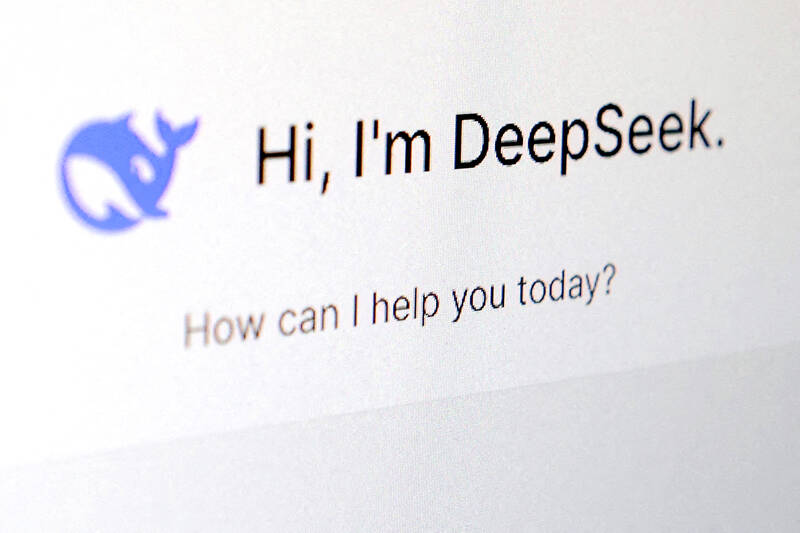All government agencies would be prohibited from using DeepSeek (深度求索), a Chinese artificial intelligence (AI) model, to protect national information security, Premier Cho Jung-tai (卓榮泰) said yesterday.
The announcement came after the Ministry of Digital Affairs on Friday last week said that government agencies should not use DeepSeek.
There are concerns regarding the DeepSeek chatbot, including potential breaches of copyright laws in its data acquisition and ideological censorship, as well as data bias in its language model training, Cabinet spokeswoman Michelle Lee (李慧芝) quoted Cho as saying in a news release.

Photo: Reuters
Public universities and research institutions can use DeepSeek if they acquire the proper approval, Lee said.
However, universities and research institutions should download the model to computers that do not contain personal data for safety, National Science and Technology Council Minister Wu Cheng-wen (吳誠文) said.
Cho called on Minister Without Portfolio Lin Min-hsin (林明昕), National Development Council Minister Paul Liu (劉鏡清) and Wu to expedite and bolster regulations around AI and data governance so that government agencies and private sector entities have clear guidelines regarding AI.
Meanwhile, Chinese Nationalist Party (KMT) Legislator Lee Yen-hsiu (李彥秀) urged the government to clarify the scope of its ban on DeepSeek, while ruling Democratic Progressive Party (DPP) lawmakers called for greater caution.
Lee Yen-hsiu on Saturday criticized the digital ministry for failing to provide a sufficient explanation when it announced the ban.
The ban applies to employees of central and local government agencies, public schools, state-owned enterprises and semi-official organizations, as well as entities working on critical infrastructure projects and in government-endowed foundations, the ministry said.
It did not provide further details related to enforcement or the specifics of the restrictions.
Lee Yen-hsiu questioned the Principles on Restricting the Use of Products That Endanger National Cyber Security issued by the Executive Yuan in 2019, which formed the basis of the ban, adding that its vast scope could have unintended consequences.
The broad restrictions could negatively affect academic research and student learning, she said.
Some DPP lawmakers supported the ban, stressing Taiwan’s vulnerability to military and cybersecurity threats from China.
DPP Legislator Wang Ting-yu (王定宇) urged Taiwan to exercise greater caution on the service.
He also called on businesses and individuals in the private sector to be more vigilant on cybersecurity and avoid using DeepSeek products if there are security risks.
Last week, the Italian Data Protection Agency ordered DeepSeek to block its AI model in the country over concerns about its use of personal data, while US and Australian officials have also raised privacy concerns.
DeepSeek has also roiled the global tech market, with reports claiming it rivals US AI products despite using inferior chips amid a ban on the sale of the most advanced chips to Chinese companies.

Taiwan is stepping up plans to create self-sufficient supply chains for combat drones and increase foreign orders from the US to counter China’s numerical superiority, a defense official said on Saturday. Commenting on condition of anonymity, the official said the nation’s armed forces are in agreement with US Admiral Samuel Paparo’s assessment that Taiwan’s military must be prepared to turn the nation’s waters into a “hellscape” for the Chinese People’s Liberation Army (PLA). Paparo, the commander of the US Indo-Pacific Command, reiterated the concept during a Congressional hearing in Washington on Wednesday. He first coined the term in a security conference last

Prosecutors today declined to say who was questioned regarding alleged forgery on petitions to recall Democratic Progressive Party (DPP) legislators, after Chinese-language media earlier reported that members of the Chinese Nationalist Party (KMT) Youth League were brought in for questioning. The Ministry of Justice Investigation Bureau confirmed that two people had been questioned, but did not disclose any further information about the ongoing investigation. KMT Youth League members Lee Hsiao-liang (李孝亮) and Liu Szu-yin (劉思吟) — who are leading the effort to recall DPP caucus chief executive Rosalia Wu (吳思瑤) and Legislator Wu Pei-yi (吳沛憶) — both posted on Facebook saying: “I

Sung Chien-liang (宋建樑), who led efforts to recall Democratic Progressive Party (DPP) Legislator Lee Kun-cheng (李坤城), was released on bail of NT$80,000 today amid outcry over his decision to wear a Nazi armband to questioning the night before. Sung arrived at the New Taipei District Prosecutors’ Office for questioning in a recall petition forgery case last night wearing a red armband bearing a swastika, carrying a copy of Adolf Hitler’s Mein Kampf and giving a Nazi salute. Sung left the building at 1:15am without the armband and covering the book with his coat. Lee said today that this is a serious

A court has approved Kaohsiung prosecutors’ request that two people working for Democratic Progressive Party (DPP) Legislator Lin Dai-hua (林岱樺) be detained, as a probe into two cases allegedly involving her continues. The request was made on Friday, after prosecutors raided Lin’s two offices and the staffers’ residences, and questioned five on suspicion of contravening the Anti-Corruption Act (貪汙治罪條例). The people included the directors of Lin’s Daliao (大寮) and Linyuan (林園) district offices in Kaohsiung, surnamed Chou (周) and Lin (林) respectively, as well as three other staffers. The prosecutors’ move came after they interrogated Lin Dai-hua on Wednesday. She appeared solemn following